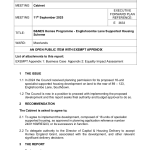The decisions we make today; the way we order our lives; the issues we avoid and put off; these don’t just affect us and the immediate future, but those who come when we have gone.
Here’s a thinking problem. What will the world look like in the year 4020?
This seems a strange question. How can we possibly know what the next 2000 years will bring, or indeed have any impact on it?
From Confucius “Study the past if you would define the future” to Churchill “The farther backward you can look, the farther forward you are likely to see”, historians and writers have encouraged us to look to the past to know the future.
And indeed, the events of the past 2000 years shape and govern how we live today, from the rise of monotheistic religion, to the transport infrastructure and national geographies bequeathed by the Romans, and more recently, the harnessing of the earth’s energy resources that powered our Industrial revolution.
So it would be strange indeed if our actions today did not still resonate in 4020.
And while we have come to understand the physical laws that govern the universe, the law that has the most impact on us and our children is by definition the least understood of all. And that is the Law of Unintended Consequences.
No-one set out to create global climate change, to create the conditions for novel and devastating disease or weapons that could expunge our species from the planet, yet here we are, with all of these and more.
But we do now have the knowledge, experience and intelligence to think through our actions, to minimise the impact of the Law of Unintended Consequences, and to mitigate that other inevitable law of human action , “What can go wrong, inevitably will”. And hopelessness and helplessness are the tools of the despot and dictator, not a defended democracy.
There are, of course, some things which are inevitable, if not yet detailed. History tells us that political boundaries change, empires fall and rise and attitudes and accepted norms change. So we know that countries will cease to exist and come into being, the USA will not continue to dominate, perhaps replaced by China, and that our attitudes towards such things as religious and ethnic groupings and our relationship with the environment will change. Who knows, one day your descendants may be apologising and condemning you for eating meat, or driving a car or even building on all the green spaces.
What we do know now, thanks to science, is that our past actions will lead to an unstoppable change in our environment. We know the planet is warming unnaturally , we know the consequences of that and we know that the best we can do, if we deliver on our pledges, is to limit that rise.
We also know that by the end of this century ( that’s only 80 years folks), large parts of London, New York, Florida and many other coastal cities will be under water permanently, or subject to constant storm flooding, making them practically uninhabitable.
Locally, the Somerset Levels will return to the landscape last seen by the Romans, when Glastonbury was an estuary port, and Langport, well, the clue’s in the name.
( Lesson – don’t buy a beach-side property).
The upheaval associated with these events may well trigger some of the social changes mentioned above. With land and food crops becoming scarcer and, ironically, lack of fresh water, these are the conditions for conflict.
Which is a shame, because we have much to be proud of. Our remarkable technological advances in a very short time afford opportunities for exciting new developments, chances to reprieve ourselves, to explore other realms and learn more about where and how we live.
So we can take action, we can think things through, plan for inclusivity and deliver on our promises.
And maybe our childrens’ childrens’ children won’t be saying of us ‘What were they thinking? How could they let this happen?













 Total views : 106496
Total views : 106496

Leave a Reply